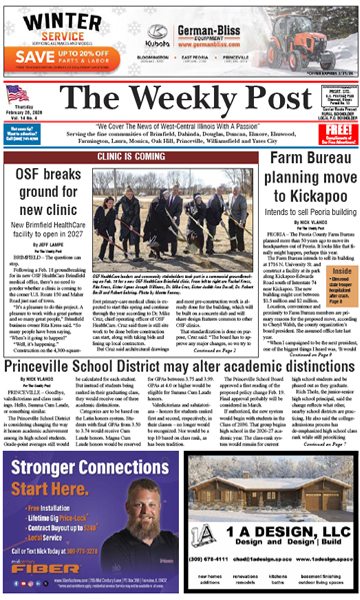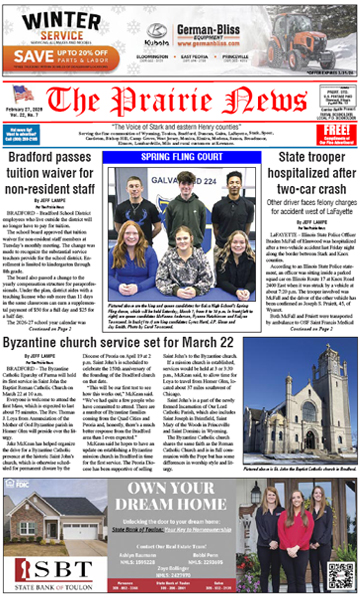By JEFF LAMPE
Weekly Post Staff Writer
While some of Illinois’ questions were answered in Tuesday’s election, many more remain undecided in regards to the ongoing COVID-19 pandemic.
The continued debate over how best to deal with a recent dramatic upsurge in positive cases is resulting in special school board meetings, proclamations of civil disobedience, new lawsuits and more.
First to the schools. Last week, the Illinois Department of Public Health changed its classification of basketball to a highrisk sport from its previous designation of medium-risk. And Gov. JB Pritzker has said that basketball can’t be played until spring.
That jeopardizes the Illinois High School Association’s scheduled start dates of Nov. 16 for practices and Nov. 30 for games. But the IHSA’s board of directors said last week it will not heed the latest IDPH changes and, aside from a few additional restrictions, will leave the decision of whether or not to compete up to local schools.
That has sent local superintendents, principals and athletic directors scrambling.
“The Governor’s recent designation of basketball being a high risk activity and IHSA’s contradictory proclamation that there will be a basketball season has put school districts in a difficult position,” Elmwood CUSD 322 superintendent Chad Wagner said. “Unless some agreement can be made by those entities, the Elmwood Board of Education will inevitably make that decision.”
Wagner said there could be a special school board meeting before the regular Nov. 23 board meeting. At Williamsfield, Superintendent Tim Farquer said representatives from the Williamsfield and ROWVA school boards were meeting this week, with basketball on the agenda for their coop team.
“Our insurance company has informed us our policy does not cover liability associated with communicable disease. They implied other school districts are in the same boat,” Farquer said. “In addition, our district has committed to following all IDPH guidelines thus far. I don’t anticipate that changing.”
Farmington is expected to discuss basketball at its Monday school board meeting, according to Superintendent Zac Chatterton, who said it may still be too early to make a decision.
Similarly, Princeville is less certain about its course of action, according to Principal Richard Thole, who said if the decision is ultimately left up to each district, “our administrative team including the athletic director, will consult with all stakeholders prior to taking a recommendation to the school board.”
A Nov. 2 poll by the Illinois Athletic Directors Association of 372 athletic directors from across Illinois showed 9 percent were planning to play basketball, 29 percent were not and 62 percent were unsure. In the mean time, most schools are requiring that any practices do not involve contact and that players must wear masks.
Bars and restaurants
The closure of bars and restaurants to inperson dining/imbibing has not been well received across Illinois, where all 11 of the state’s regions are now under the increased restrictions. The Peoria area was the last to face the additional requirements, which took effect Wednesday. Some business owners have said publicly they will not heed the new requirements. That comes despite Gov. JB Pritzker saying he will direct the Illinois State Police to issue fines for violators and will seek to have liquor and gambling licenses pulled for those who do not follow his guidelines.
Managers of Cerno’s in Elmwood and Kewanee posted on Facebook that they will remain open. “We at Cerno’s along with many other restaurants and bars in the area have decided to keep our doors open. We understand this year has been full of confusion and information that is hard to tell fact from fiction. Many of the restaurant and bar owners from the surrounding area met last night and are standing together to say enough is enough. We know our rights and are done being intimidated and threatened with false and illegal threats. If you as an individual do not feel comfortable dining out then we respect that.”
The Illinois Restaurant Association is fighting the changes and has said banning indoor service at this point could cause the permanent closure of at least 20 percent of restaurants statewide. State officials say contact tracing of people who test positive for COVID-19 shows bars and restaurants were the second most common place those people had been in the previous week, behind only social gatherings with friends and family







